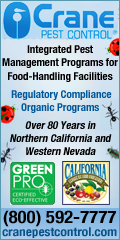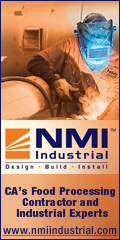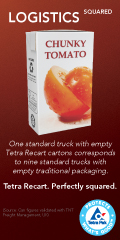
| Archives/Subscribe | www.clfp.com | Contact Us | October 2, 2012 |
Partnering for the Safety of Our Workforce
Article provided by Amy Wolfe, MPPA, CFRE, President and CEO, AgSafe and Trudi Hughes, Government Affairs Director, CLFP Processors often remark that one of their biggest challenges doing business today is being aware of the countless local, state and federal regulations impacting day-to-day operations. There is certainly no shortage of laws dictating how to keep workers safe and healthy. And while most processors want to protect their employees from the hazards inherent in this industry, it’s easy to become overwhelmed with the pages upon pages of legal requirements. In an effort to ensure our members are abreast of the latest regulatory changes, citation trends and most importantly, have access to resources needed to protect our workers, we have teamed up with AgSafe to focus on three issues impacting processors: lock out/tag out/block out, machine guarding and forklift safety. AgSafe is a statewide non-profit organization dedicated to providing employers and employees in the agricultural industry with education and resources to prevent injuries, illnesses and fatalities. Their vision is to be a one-stop resource providing safety solutions for the agricultural industry. Since its formation in 1991, AgSafe has trained over 25,000 owners, managers, supervisors and workers in the safety, health and human resources issues impacting all aspects of agriculture. The organization has taken a hands-on approach to worker safety and health. Training programs and resources are developed in partnership with safety and human resources practitioners with an emphasis on practical, real-world solutions to compliance conundrums. AgSafe has developed a broad network of commodity-specific experts across California, all volunteering their expertise and decades of experience towards the development of well-rounded, realistic safety and human resources solutions. In addition, AgSafe integrates culturally and linguistically appropriate training to meet the needs of our diverse workforce. Ultimately, the organization wants to ensure that every worker goes home each day healthy and whole. To do so, it is essential that information be provided in such a way that all workers understand and embrace the lessons of safety. Issues Impacting Processors When the teams at CLFP and AgSafe came together to determine how best to serve the CLFP membership, a variety of worker safety issues were discussed. CLFP staff sought input from a variety of members and also considered existing citation data when determining the best place to start. As a result, this year’s partnership will focus on three key issues: lock out/tag out/block out, machine guarding and forklift safety. Lock Out/Tag Out/Block Out Lock out/tag out/block out (LOTOBO) refers to the steps necessary in neutralizing hazardous energy. Energy of any type – electrical, gravity, hydraulic – poses a threat to workers. It is imperative that a series of steps be followed to minimize that risk, particularly when workers are operating, performing maintenance or cleaning the equipment. California Code of Regulations, Title 8, Standard 3314 is the Control of Hazardous Energy for Cleaning, Repairing, Servicing, Setting-Up, and Adjusting Operations of Prime Movers, Machinery and Equipment, including Lock out/Tag out. The lengthy name is appropriate given that the standard has a number of intricate components an employer must follow. In a nutshell, the standard includes requirements for cleaning, servicing and adjusting operations, repair work and setting-up operations, proper use of hardware and materials, protocol for repetitive process machines, hazardous energy control procedures, inspection procedures, and training. The processing industry has been cited more for failure to comply with Standard 3314 than any other regulation. From October 2010 to September 2011, the most current data available, processors were cited 20 times for a total of $59,155 in penalties. These citations accounted for 40% of the total number issued and 44% of the penalties levied. Machine Guarding Equipment is an integral part of the food processing business and as such, the second safety topic centers on creating systems that mitigate the risk from machines. Machine guarding, specifically California Code of Regulations, Title 8, Standard 4070 - Power Transmission Equipment, Prime Movers, Machines and Machine Parts, Belt and Pulley Drives, refers to the process of placing physical barriers between the worker and hazardous aspects of the equipment. The standard is very straightforward, stipulating that all moving parts of belt and pulley drives located 7 feet or less above the floor or working level shall be guarded. A number of exceptions are outlined and should be referenced by each individual business. Our industry frequently sees workers attempt to circumvent the guards as a means of working faster or to fix a problem, such as a jam. It is critical that workers understand why the guard is in place and the safest system for correcting problems, most often using a well-rounded LOTOBO protocol. Forklift Safety Transporting items in a food processing facility, whether raw ingredients or finished products, is a core aspect of the business. Many CLFP members maintain vast fleets of forklifts to accomplish this critical task. As a result, forklift safety is the third safety topic to be addressed. Most processors conduct regular forklift operator training and test workers’ knowledge on how best to safely drive equipment. Safe forklift operation, however, is the business of all workers and many workplace accidents impact bystanders not following safe pedestrian protocol. California Code of Regulations, Title 8, Sections 3649-3669 articulate at length the myriad of parameters in place for safe operation of forklifts. The sections address such issues as seat belts usage, deflector guards, back guards, rated capacity, maintenance, wheel guards, and operating rules, to name a few. Given the voluminous nature of the standards, it is important that forklift operators receive regular refresher training on the ins and outs of how protect themselves and others. Partnership in Action Over the course of the fall and winter, the CLFP and AgSafe will offer a series of trainings addressing each of the three issues. In addition, supplemental resources will be provided and members are encouraged to conduct self-audits of their existing safety programs. The CLFP and AgSafe are ready to provide assistance of any kind to ensure members have robust, compliant programs in place. Lock Out/Tag Out/Block Out November 1, 2012 – Northern California (Specific Location TBD) Forklift Safety January 9. 2013 – Northern California (Specific Location TBD) Machine Guarding March 20, 2013 – Northern California (Specific Location TBD) Schedule (all sessions): For more information, please contact: To learn more about AgSafe, visit www.agsafe.org. |
|
| CALIFORNIA LEAGUE OF FOOD PROCESSORS 2485 Natomas Park Dr., Suite 550 Sacramento, CA 95833 Phone: (916) 640-8150 Fax: (916) 640-8156 www.clfp.com |
 |



